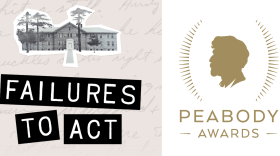NHPR’s Document podcast is launching its newest season, Death Resulting.
It investigates a weighty question: is a drug overdose an accident… or murder? It’s a question that’s become a key part of the law enforcement response to the addiction epidemic in New Hampshire, and around the country.
Reporter Jason Moon hosts Death Resulting. He joined NHPR Morning Edition host Rick Ganley to discuss the story.
Transcript
Rick Ganley: Can you tell us a little more about this charge, what's known as death resulting that you're focusing on?
Jason Moon: Yeah, it's a pretty straightforward idea. And really, it's just an enhancement to a drug distribution charge, which is already an illegal act, you know, particularly with drugs like fentanyl. And the idea is, if you distribute fentanyl and someone dies from taking that fentanyl, there's this added penalty that they can throw at you. So that's the basic charge that's kind of at the center of this story that we're telling.
Rick Ganley: What made you want to investigate this for this new season?
Jason Moon: Well, we actually heard about Josh's case, and the thing that caught my interest was how it's a story about a case in the criminal justice system that's not about what happened or who did it.
There's this other question that's a little bit harder to answer. That is, should it be a crime in the first place? Because, having done the reporting on this podcast now, there are a lot of differing opinions about whether what happened to Liz in that bathroom, and in countless overdoses across the country, whether those are murders, are they someone else's fault, or were they accidental drug overdoses?
And it's tough to come up with a simple answer to that question. And that's kind of what drew me in initially because it brings so many of the different elements of our drug policy debate together.
Rick Ganley: And advocates for these laws are saying these are deterrents, which is a classic argument, I think, for a lot of the drug laws that were in place in the last, say, 40 years.
Jason Moon: Yes, and it's very much disputed from advocates who oppose death resulting laws and even from research by the Department of Justice itself that shows that the deterrent effects of long sentences aren't there.
Rick Ganley: So what does the story go from here, Jason?
Jason Moon: Well, we follow the case of Josh, who you heard in that clip, but we also look at the history of these laws, which is also pretty fascinating. I didn't know anything about that stumbling into this story, but we go back to the 1980s in episode two to talk about where these laws came from, how they were born in a different drug crisis with different political forces at play.
But we also follow Josh Cooke's case through the criminal system here in New Hampshire and watch as the court system really has to answer that basic question that we start with: is this a murder? Is putting Josh away for a minimum of two decades the right thing to do here? It's an interesting and important question for us all to think about, but the court system actually has to come up with an answer to that and we get one by the end of the podcast.
Rick Ganley: And how can listeners find this season of Document Jason?
Jason Moon: You can search for Document wherever you get your podcasts, and this will be season three, Death Resulting.









